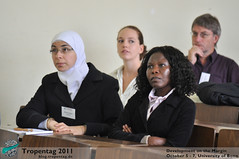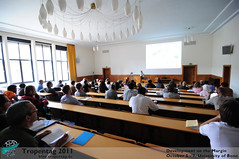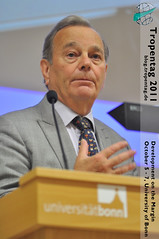Tropentag 2011
Stuck under the Weather
Wed, 10/19/2011 - 10:10 — De-Registered UserThe Seeds of the Future
Tue, 10/11/2011 - 09:56 — De-Registered User Fellow presenters listening to their colleague's presentation.
Africa stricken with Striga!
Fellow presenters listening to their colleague's presentation.
Africa stricken with Striga!
To Feed or not to Feed?
Fri, 10/07/2011 - 11:25 — De-Registered User Presentations on Animal Production Systems at Tropentag 2011.
Transforming to Integrated Ecosystems
The common thread through all the presentations was how to integrate livestock production into the natural environment. Sustainable aquaculture that aims at minimizing impact on the environment can in the long run provide farmers with much better livelihoods. We were presented with some great use of Google map imaging depicting the boundaries of land usage and how livestock production can be integrated without degrading the environments around it. A ratio between environmental land coverage and live stock land usage enforces the ongoing theme of 'doing more with less'.
Presentations on Animal Production Systems at Tropentag 2011.
Transforming to Integrated Ecosystems
The common thread through all the presentations was how to integrate livestock production into the natural environment. Sustainable aquaculture that aims at minimizing impact on the environment can in the long run provide farmers with much better livelihoods. We were presented with some great use of Google map imaging depicting the boundaries of land usage and how livestock production can be integrated without degrading the environments around it. A ratio between environmental land coverage and live stock land usage enforces the ongoing theme of 'doing more with less'.
The Meat behind an Enabling Environment
Thu, 10/06/2011 - 12:23 — De-Registered User Sir Gordon Conway, Key Note Speaker at Tropentag 2011.
Multiplier effect of agriculture.
Sir Gordon Conway, Key Note Speaker at Tropentag 2011.
Multiplier effect of agriculture.
Tropentag 2011 is back with a bang!!!A warm Welcome to all the participants!!!
Wed, 10/05/2011 - 15:30 — De-Registered UserOne of the established agricultural research conferences is back on tow.
Prof. Dr. Mathias Becker
, University of Bonn started by stating that he was sure topics titled such as “Iron Assimilation pathways are not the blockbusters” for participants to trail back year after year to this conference. He feels this year’s theme “Development on the margin” reflects the present scenario in the world very well with issues like soil degradation, inequality and so on being on the rise with globalisation aggravating the situation. This situation does not make the achievement of MDG’s easy. The worst hit due to these issues are the people living on the margins. It is one of the priority areas of the Federal Ministry of Economic Corporation and Development in Germany and hence Tropentag 2011 was strongly encouraged by the Federal Minister of BMZ, Dirk Niebel.
Search Engine for Jobs and Networking
Tue, 10/04/2011 - 16:15 — De-Registered User Master's student Dusenthi Manoharan thinks the conference is a good starting point for young researchers. She is presenting her work on a course module of Food Ethics in the Vulnerable People that she helped designed this year. As an advocate for Food Ethics her experience from last year’s theme "World Food System - A Contribution from Europe” in Zurich, Switzerland was contrary to the actual practicality during the conference meals.
Master's student Dusenthi Manoharan thinks the conference is a good starting point for young researchers. She is presenting her work on a course module of Food Ethics in the Vulnerable People that she helped designed this year. As an advocate for Food Ethics her experience from last year’s theme "World Food System - A Contribution from Europe” in Zurich, Switzerland was contrary to the actual practicality during the conference meals.
Use your opportunity to shine!
Tue, 10/04/2011 - 15:51 — De-Registered User International conferences, like Tropentag, are excellent platforms for scientific knowledge exchange, networking, and for talented new professionals to present themselves. At least this is the experience of Dr. Barbara Ramsperger, the Executive Manager of the center for Agriculture in the Tropics and Subtropics of the Univesity of Hohenheim. This experienced researcher also has advice for new and ambitious researchers:
- If you have a poster, show what you have already done with confidence. Exploit your 3 minutes of fame!
- Be proactive and don’t be afraid to approach people and talk to them
- Participate in the conference activities that you’re interested in.
Environmental issues in tropical countries have different dimensions: There are many researchers working with these issues from different perspectives, such as poverty and development. Tropentag brings together Universities, researchers, students, NGOs and other institutions and allows them to share their knowledge in several poster sessions, oral presentation, plenery sessions and social events.
International conferences, like Tropentag, are excellent platforms for scientific knowledge exchange, networking, and for talented new professionals to present themselves. At least this is the experience of Dr. Barbara Ramsperger, the Executive Manager of the center for Agriculture in the Tropics and Subtropics of the Univesity of Hohenheim. This experienced researcher also has advice for new and ambitious researchers:
- If you have a poster, show what you have already done with confidence. Exploit your 3 minutes of fame!
- Be proactive and don’t be afraid to approach people and talk to them
- Participate in the conference activities that you’re interested in.
Environmental issues in tropical countries have different dimensions: There are many researchers working with these issues from different perspectives, such as poverty and development. Tropentag brings together Universities, researchers, students, NGOs and other institutions and allows them to share their knowledge in several poster sessions, oral presentation, plenery sessions and social events.




